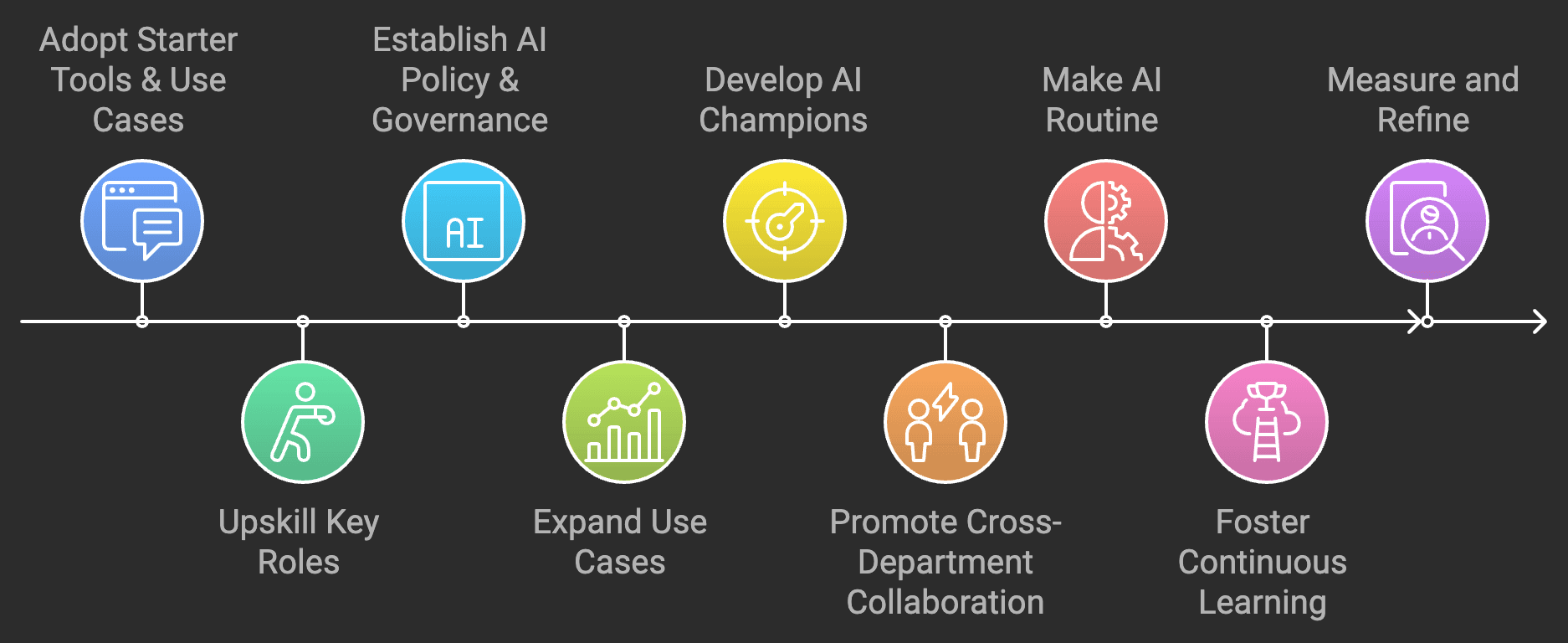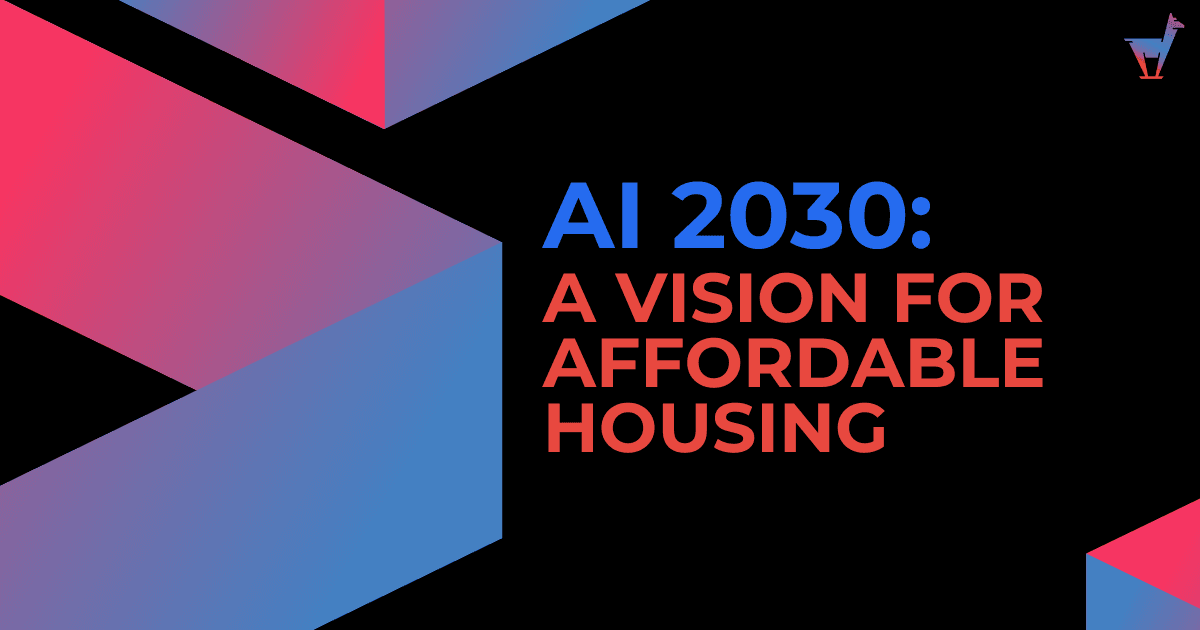October 22, 2024
What is the five-year vision for AI enablement in my organization?
By 2030, AI won’t just support affordable housing teams in simple tasks - it’ll be integrated throughout their day-to-day work. We engaged with top AI advisors at The Strategic Edge as well as affordable housing organizations to create a vision for what 2030 could look like.
AI is already reshaping affordable housing, helping organizations save time, reduce costs, and improve outcomes. Over the next five years, it will do even more—streamlining operations, enhancing decision-making, and transforming how key roles operate.
But here’s the thing: AI won’t replace your team. Instead, it’ll work alongside them, handling repetitive and data-heavy tasks so people can focus on what they do best—thinking strategically, solving complex problems, and serving residents.
Role Evolution with AI in Affordable Housing
Here’s how we envision key roles will evolve, what skills they’ll need, and how they’ll use AI to amplify their impact:

Property Management Roles
Roles within property management organizations will utilize AI tools to automate insights about the people they serve - and use this information to double-down on the human touch. The objective: to reduce the time spent in front of a computer or phone screen and into engaging 1:1 interactions with residents.
Community Managers
How AI Helps: AI automates lease renewals, compliance reporting, and resident communications. Chatbots handle routine inquiries, freeing up managers to focus on people-first tasks: resident satisfaction and community engagement.
Skills to Build:
Data-Driven Decision-Making: Managers will need to analyze AI-generated insights about resident needs and property performance.
Digital Communication Tools: Familiarity with AI-enhanced resident portals and chatbots - and the insights they generate - is essential for managing resident interactions & engagement.
Human Relationship Management: The human touch will matter more than ever - property managers must balance data insights with empathy, resilience, quick thinking, and other soft skills.
Maintenance Technicians
How AI Helps: Predictive maintenance tools flag potential issues before they become costly emergencies. AI-powered augmented reality systems guide technicians step-by-step during complex repairs.
Skills to Build:
Using Predictive Maintenance Tools: Technicians will transition to AI-generated work orders and AI-prioritized repairs and maintenance.
AR-Assisted Troubleshooting: Comfort using augmented reality devices to follow AI-driven repair instructions.
Proactive Maintenance Planning: Understanding how to use AI insights to schedule preventive maintenance against available internal & external experts.
Resident Services Coordinators
How AI Helps: AI identifies residents at risk of housing instability or other challenges, suggesting personalized interventions and support plans.
Skills to Build:
Interpreting Resident Analytics: Coordinators need to understand how to utilize AI-created insights and act on specialized recommendations for resident programming and individualized intervention.
Privacy and Ethics Training: Handling sensitive data responsibly is critical when working with AI insights.
Program Development: Using AI to design and evaluate the outcomes and impacts of resident services that meet evolving community needs.
Asset & Investment Management Roles
Asset and investment management roles are already accustomed to working with immense amounts of data to create reports, dashboards, and models. AI amplifies these data-driven roles with steroids, automating routine tasks to spend more time & effort in predictive and prescriptive modeling.
Asset Managers
How AI Helps: AI tracks portfolio performance, highlights underperforming assets, and forecasts market conditions to guide strategic decisions.
Skills to Build:
Financial & Operational Modeling with AI: Asset managers will need to validate AI-generated financial models and operating scenarios, then track actual performance against modeled performance for tighter predictions about the future.
Market Trend Analysis: Understanding how to integrate internal AI-generated insights with real-world knowledge and benchmarks from the affordable housing market.
Risk Assessment: Using AI to evaluate asset & portfolio risks and opportunities proactively alongside development and investment teams.
Investment Analysts
How AI Helps: AI evaluates potential acquisitions and developments by analyzing market trends, demographics, and ROI projections.
Skills to Build:
AI-Powered Market Analysis: Analysts need to assess the reliability & consistency of AI-driven insights and adjust strategies accordingly.
Scenario Planning: Building and comparing multiple scenarios with AI tools to inform investment decisions.
Critical Thinking: Using human judgment to validate, refine, and communicate predictions - nothing can replace the art of real estate investment nor the art of relationship management.
Development, Construction, Preservation, and Acquisition Roles
These professionals are skilled collaborators and negotiators in every affordable housing organization. AI enhances these strengths with faster access to insights about projects and deals - while mitigating the routine, manual management and oversight of external stakeholders (including general & subcontractors, community housing associations, financial institutions, and government regulators.)
Asset Development, Construction, and Preservation Teams
How AI Helps: AI optimizes project schedules, forecasts material needs, and assesses long-term sustainability of projects. Preservation teams use AI to identify properties needing rehabilitation before major issues arise.
Skills to Build:
AI-Enhanced Project Management: Using AI tools to track & predict timelines, resource allocation, and costs.
Sustainability Analytics: Interpreting AI predictions about energy efficiency and long-term maintenance needs.
Collaboration Across Teams: Coordinating AI insights across disparate teams, including construction crews, architects, and planners.
Acquisition Teams
How AI Helps: AI automates the due diligence process, analyzing financials, assessing property conditions, and forecasting ROI.
Skills to Build:
AI-Assisted Deal Evaluation: Teams will need to validate AI-generated assessments of property value and investment potential. "Trust but verify" will be the mantra of these teams.
Negotiation Skills: Using AI insights to strengthen negotiation positions.
Regulatory Compliance Knowledge: Ensuring AI tools consider zoning laws, funding requirements, and other regulatory opportunities or constraints.
Operational Roles
Operational roles focus on aligning process to strategy and execution patterns. We don't need fifteen ways to process payroll; we just need one and we need to do it the same way each time. AI will step in to relieve operations people from mundane, routine tasks and processes that machines are well-equipped to do, creating opportunity to leverage these strengths - and other hard skills - across the rest of the organization.
Accounting and Finance Roles
How AI Helps: Routine tasks like reconciliation, budgeting, and financial reporting are automated. AI provides real-time cash flow forecasts and flags irregularities for human review.
Skills to Build:
AI-Driven Financial Planning: Using AI to analyze spending patterns and optimize budgets and cashflow.
Fraud & Anomaly Detection: Understanding how AI flags anomalies and when to investigate further.
Collaboration with AI Tools: Allowing AI to take on low-level, routine tasks to uplevel human talent.
Marketing & Communications Roles
How AI Helps: AI tools will generate hyper-targeted marketing campaigns and content, automate social media management, and analyze outreach effectiveness. Sentiment analysis tools will provide insights into resident and stakeholder perceptions.
Skills to Build:
AI-Driven Campaign Management: Teams will update their workflows to incorporate AI for development and refinement of property-level, investor, regulatory, and corporate messaging based on insights.
Content Personalization: Understanding how to use AI to create tailored, individualized content at scale.
Analytics Interpretation: Using AI tools to assess campaign performance and adjust strategies in real time.
Leadership Roles
Everything starts with buy-in from the top. Leaders in affordable housing organizations will see their role evolve to incorporate AI as a thought partner and insight analyst. The pairing of data and insights with human wisdom frees up time to ensure the portfolio is on track, strategic differentiation strong, and the future vision for the organization ambitious and achievable.
How AI Helps: AI gives leaders unprecedented access to insights - everything from real-time portfolio performance to predictive models for resident needs or market opportunities. No longer are leaders constrained to standard, routine reporting; they'll have access to tools to dig deeper for on-the-spot questions and insights. Leaders will use these tools to make more informed decisions and communicate more effectively while focusing on strategy, culture, and innovation.
Skills to Build:
AI Literacy: Leaders must understand how AI tools work, their limitations, and how to interpret AI-generated insights responsibly.
Change Management: Driving organizational buy-in and adoption of AI across teams.
Ethical Oversight: Setting standards for responsible AI use and ensuring alignment with organizational values.
Visionary Thinking: Identifying new opportunities for AI to create value while maintaining a people-centered mission.
Roadmap to 2030: Getting There in Five Years
Reaching this vision requires more than just buying tools—it demands intentional action to integrate AI into workflows, build & grow talent with the right set of skills, and adapt organizational culture.
A high-level roadmap to this transformation:

Year 1–2: Build the Foundation
Adopt Starter Tools & Use Cases: Begin with AI tools for high-impact areas, like chatbots for resident communication, predictive maintenance, and financial reporting.
Upskill Key Roles: Provide training focused on how AI tools will enhance specific roles. Keep it practical—teach teams how to interpret and apply AI insights.
Establish AI Policy & Governance: Create clear policies for data privacy, ethical use, and decision-making accountability. Assign leaders to oversee AI implementation and hold them accountable to aligned objectives.
Year 3–4: Scale and Integrate
Expand Use Cases: Introduce AI tools for advanced processes and workflows like market analysis, portfolio optimization, and resident services planning.
Develop AI Champions: Identify tech-savvy staff in each department to serve as in-house experts and resources for their peers.
Promote Cross-Department Collaboration: Use AI to align insights and workflows between teams, such as sharing resident feedback with property managers and service coordinators.
Year 5: Optimize and Evolve
Make AI Routine: By Year 5, AI should be embedded into daily operations, with every team member using it as part of their role.
Foster Continuous Learning: Establish ongoing training programs to keep teams updated on AI advancements.
Measure and Refine: Regularly review the impact of AI tools on performance, resident outcomes, and equity. Adjust tools and strategies as needed.
The Future Is Collaborative
AI isn’t here to replace people—it’s here to elevate them. By 2030, human-AI collaboration will be the standard in affordable housing, with AI handling the heavy lifting on repetitive tasks and people focusing on building relationships, solving problems, and driving strategy.
The time to start is now. By laying the groundwork, upskilling teams, and adopting AI thoughtfully, your organization can lead the way into this collaborative future—and deliver better outcomes for residents, stakeholders, and your bottom line.
Ready to start the journey? The Strategic Edge can help. Book a 15 minute call with our advisors to chat about your vision for AI (or ask about how to create the specific vision for your organization.)
